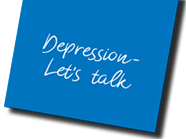How normal are my feelings?
Even though depression is a common experience, there is a lot of misunderstanding around it.
Someone can be suffering but that does not mean they are depressed.
Difficult circumstances provoke “mental distress”. This is a natural and normal reaction to adversity and loss, and this is part of a healthy and adaptive process.
When people experience this kind of individual suffering and distress, which can be mild to severe in intensity, they can experience some symptoms such as sleep, appetite or sexual difficulties, or even headaches or a peak in blood pressure.
Mental distress can be acute and last some hours or be more severe and prolonged for weeks, even months, like mourning the death of a loved one or the end of a long-term relationship.
In these more severe examples of common responses to common life events, there is a risk that an individual may develop depression.
Depression is a medical condition that affects the way mood is regulated by the brain – that is, a 'mood disorder'. Depression affects feelings, thoughts and body functions. Experiencing depression involves intense negative emotions and feelings and loss of interest, fatigue, change in sleep, sexual activity and weight or appetite. It also involves negative ideas such as pessimism, low self-esteem, indecisiveness and suicidal ideation, and other specific symptoms. On the whole, these symptoms will produce an undesirable effect on people's lives, for example impacting on personal wellbeing, work and relationships.
In that case it might be important that you see your doctor for diagnosis and treatment.
But before you do that, take a self-test.



